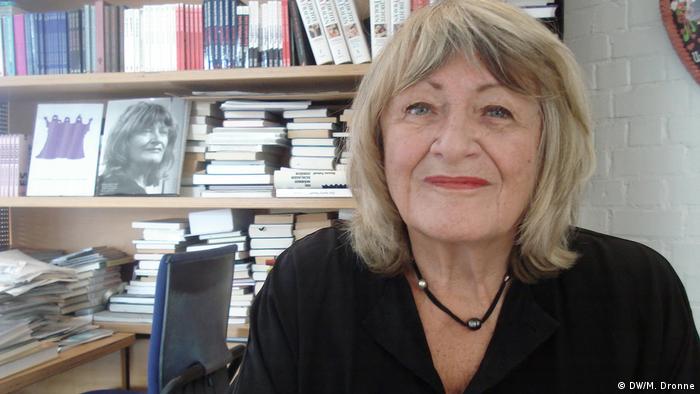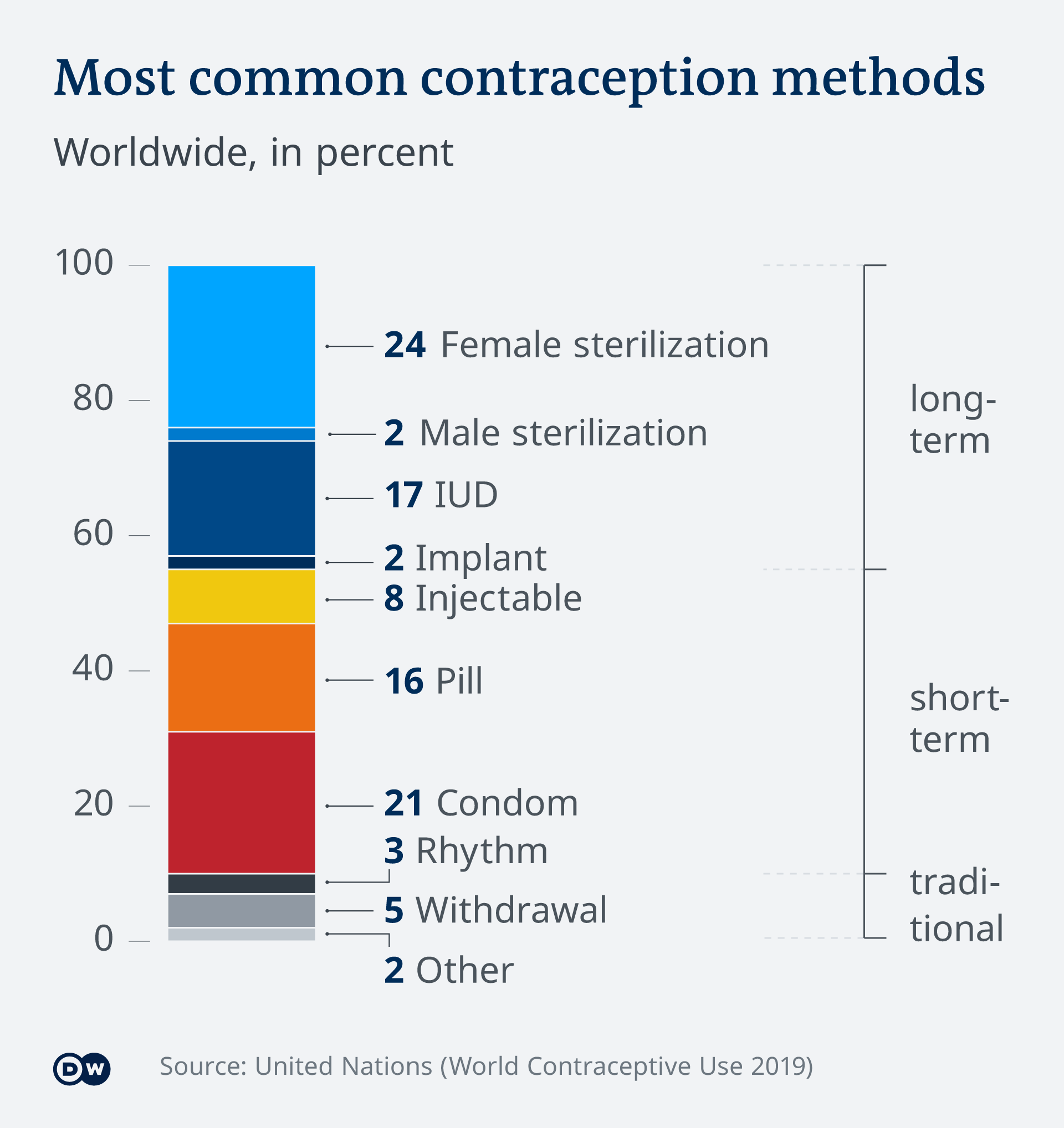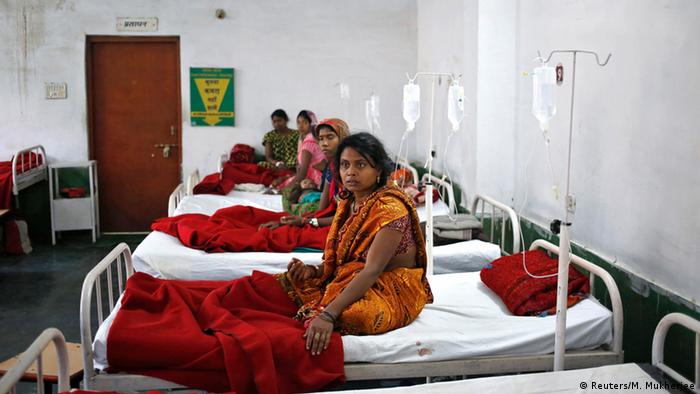The pill at 60 — transformative and controversial birth control
The birth control pill, often simply called "the pill," was first approved for use 60 years ago. The oral contraceptive changed lives and lifestyles. It was championed but also condemned. But how relevant is it today?

As tiny as it is, the pill had a huge impact. The first birth control pill was introduced to the US market on August 18th,1960. It was a sensation: the first form of hormonal contraception. A year later, the pill became available in West Germany and four years after that in East Germany.
Initially, the pharmaceutical industry marketed it as a treatment for menstruation complaints. It was exclusively prescribed to married women. And only a careful reading of the small print revealed its contraceptive capacity.
The pill also had further remarkable "side-effects" and, above all, the social impact was explosive. This new method of contraception went further than any that had gone before towards decoupling sex for fun and sex for reproduction. It gave women unprecedented power over their bodies and their sexuality.It was truly a sexual revolution.

The pill gave momentum to societal changes in western countries in the 1960s
At the time, the fear of an unwanted pregnancy dominated sexuality, recalls author and women's rights activist Alice Schwarzerin an interview with German public TV, explaining it was central to all aspects of women's lives. "You were well aware that abortion was not at all an option. There were all sorts of rumors about kitchen tables and women bleeding to death." Even putting moral qualms aside, the prospect of an abortion was simply too terrifying: "So, when the pill became available in the first half of the 1960s — I was a young woman in a wild stage of my life — it was in every way a liberation. It was just fantastic. We all, I think, welcomed it. It was like a miracle."
Read more: Depression and suicide — the dark side of the pill
Doctors' warnings, papal ban
Up until that time, the "3 C's" dominated women's role in society: children, chores, church. In conservative post-war Germany, the idea that women could take charge of their lives was still novel. And there were the first rumblings of protest against the pill. Even doctors were up in arms.
Speaking to DW, medical historian Robert Jütte looked back on what was called the "Ulm Declaration" of 1964. In this appeal, some 200 doctors warned "that there would be devastating consequences if love were to remain without consequences." The former head of the Institute for the History of Medicine at the Robert Bosch Foundation adds: "There was a broad and authoritarian social consensus that contraception must be limited."
From the church, there was also bitter opposition to the pill. On July 25, 1968, Pope Paul V issued the papal encyclical Humanae Vitae condemning birth control using artificial methods of contraception. This would only encourage, "a general lowering of moral standards" resulting from sex without consequences. For devout Catholics, those words effectively amounted to a banning of the pill.

The recipe for birth control pills has changed since the 1960s
'Make love, not war'
But the zeitgeist was moving in another direction, and the old social order was crumbling. As people became more prosperous, the yearning for self-realization and individual freedom grew. The sexual revolution swept away stifling conventions and the hippy mantra of "make love, not war" played a key role in the 1968 student movement.
Suddenly people were changing partners in way that had previously been unimaginable. One of the most famous slogans of West Germany's protest movement was: "Anybody who sleeps with the same partner twice has sold themselves to the establishment." But Robert Jütte says it is important not to exaggerate the role of the pill. It was, he argues, not the origin of this movement, but the catalyst.

Feminist Alice Schwarzer says the sexual liberation also had its downsides
The sexual revolution also led to new constraints. "Before it came along, young girls and women simply got married. And now? With the pill, things were turned upside down and women had to be up for it," says the feminist Alice Schwarzer. If a woman wasn't taking the pill, people would start saying, "she's too narrow-minded, and nobody had danced with her so far." Women were permanently at men's sexual disposal. And men took no responsibility for any consequences that might arise."
Growing demand for non-hormonal birth control
In Germany, the pill has long been established as the most widely used and 'safest' method of contraception. But it still has to be prescribed by a doctor. And the health insurance companies pick up the costs for young women and girls only below the age of 22. But there is also financing available to older women, who pay less than 30 euros for a six-month packet.
Read more: Fewer German women are taking the pill

The pill can improve skin complaints — but it's not a beauty product without health risks
Nevertheless, there is a growing intolerance for the pill, with young women increasingly reluctant to do anything that might impair natural hormonal processes. For about five or six years now, Gabrielle Stöcker has been seeing "a growing demand for non-hormonal birth control and for an alternative to the pill," says the gynecologist. She works for Pro Familia, Germany's leading sexual and reproductive health organization. And she says that while the pill might be a good contraceptive, it is also a form of medication with side-effects.
Which is why Stöcker is critical of pharmaceutical companies that market their preparations as lifestyle and beauty products. The promise might be: The pill keeps you slim, or it improves your skin. And everything is done to downplay the danger of the pill causing thrombosis.
Look at the advertising and you could almost begin to imagine that "the pill is a beauty product without any risks," says Gabrielle Stöcker. "It's clear that women suffering from side-effects or complications are no longer taken seriously."

World number four
Stöcker's observation is substantiated by a 2018 study from Germany's Federal Center for Health Education on birth control patterns among adults, according to which the pill and condoms are still the most important contraceptives (47% and 46% respectively). But in comparison with the previous study from 2011, the use of the pill has gone down by 6% while there has been a clear 9% increase in the preference for using condoms. Prevention of HIV and other STDs is clearly a factor here.
Read more: Why are condoms so unpopular in India?
It is mainly in other European countries that the pill is as frequently used as in Germany. In global comparison, however, figures put out by the United Nations suggest that the most popular contraceptive worldwide is female sterilization — although this kind of intervention is in medical terms far less complicated for men. In the past year, 23.7% of all women using contraception (219 million) were sterilized. Condoms were in second position (189 million) ahead of the intrauterine device, or coil (159 million). The pill followed in fourth place. (151 million).

In India women often undergo sterilization surgery, which is often unsafe
Poor countries putting their faith in sterilization
In developing countries in the Global South the problems begin with getting supplies of antibiotics due to infrastructure or financial problems. The fact that the daily contraceptive pill is hardly a success story in those regions is not at all surprising.
Medical historian Robert Jütte explains that the poor distribution of the pill in these countries is also due to the widespread suppression of women in society. "And it's important not to overlook the government repression in Islamic states that are in principle opposed to birth control. It's a combination of social, economic and political factors."
Rütte points out that even in the countries with the lowest levels of gross national product in the world, "still 28% of women use birth control methods." He says that in these countries, with their poor medical care, "it is contraceptive methods like the sterilization of women or the coil that will in the long term play a bigger role than the pill."
DW RECOMMENDS
Sexual revolution can't be blamed on the pill, says its inventor
To mark the 50th anniversary of the introduction of the birth-control pill in the US, Carl Djerassi tells Deutsche Welle what events led him to this medical breakthrough, and how it changed the world.
No comments:
Post a Comment